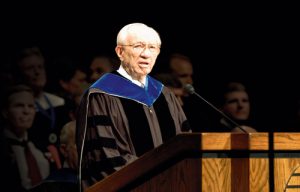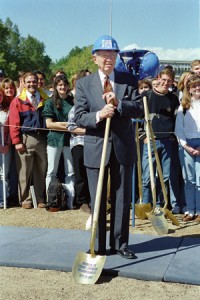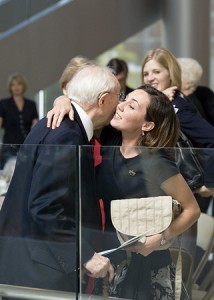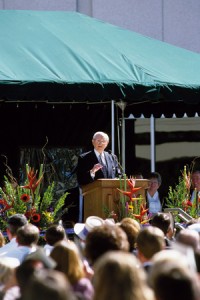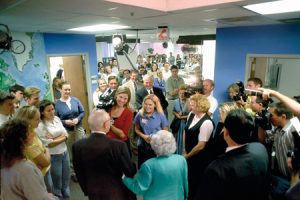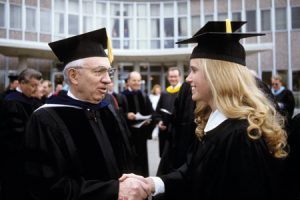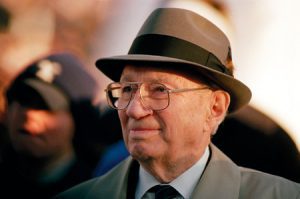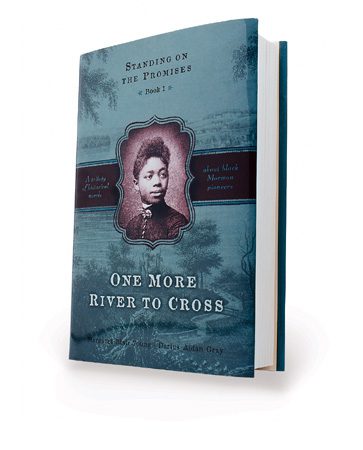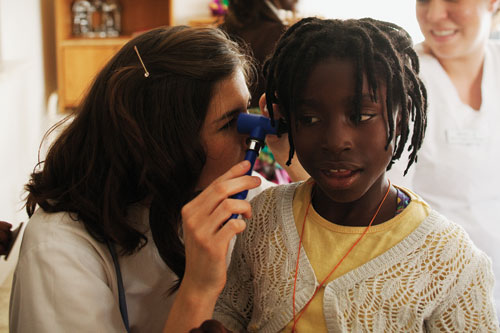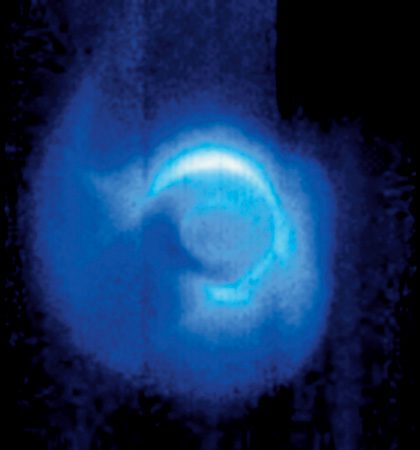Selected quotes from BYU devotional addresses.
Few people have been as closely involved in shaping BYU’s distinctive mission as President Gordon B. Hinckley. In nearly a half-century on the BYU Board of Trustees, he has made hundreds of campus visits; he began speaking to BYU audiences even earlier and has addressed students and faculty in devotionals and firesides more than 40 times.
In these talks President Hinckley opens his heart and mind to students, his “dear young friends,” as he calls them, sharing his trademark wit and wisdom, his prophetic guidance and warnings, and his abiding love and encouragement.
As BYU prepares to build a new edifice in the prophet’s name, the following excerpts from President Hinckley’s BYU speeches and the accompanying photographs speak to this decades-long relationship that continues to bless BYU and its students.
You Must Be a Leader
You are here majoring in math, in chemistry or physics, in law, in English, whatever. This schooling is designed to equip you to earn a living in the society of which you will become a part. But you cannot simply sit in your laboratory or your library and let the world drift along its aimless way. It needs your strength, your courage, your voice in speaking up for those values that can save it.
If this university meets the purpose for which it is maintained, then you must leave here not alone with secular knowledge but, even more important, with a spiritual and moral foundation that will find expression to improve the family, the community, the nation, even the world of which you will be a part. . . .
. . . You can be a leader. You must be a leader, as a member of this Church, in those causes for which this Church stands. (“Stand Up for Truth,” Sept. 17, 1996, pp. 3, 5).
Experiment and Accomplishment
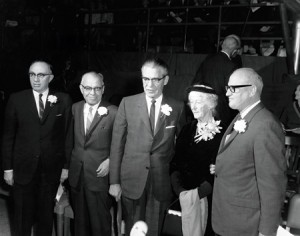
This institution is . . . a continuing experiment on a great premise that a large and complex university can be first class academically while nurturing an environment of faith in God and the practice of Christian principles. You are testing whether academic excellence and belief in the Divine can walk hand in hand. And the wonderful thing is that you are succeeding in showing that this is possible—not only that it is possible, but that it is desirable, and that the products of this effort show in your lives qualities not otherwise attainable. (“Trust and Accountability,” Oct. 13, 1992, p. 2)
Here we are doing what is not done in any other major university of which I am aware. We are demonstrating that faith in the Almighty can accompany and enrich scholarship in the secular. It is more than an experiment. It is an accomplishment. (“Remarks at the Inauguration of President Cecil O. Samuelson,” Sept. 9, 2003, p. 1)
Sleeping and Waking
I appreciate very much the music of the [BYU Symphonic Band]. You are all awake after that. I will do what I can to restore you to your former state. I have come here today without a written talk. I had one but discarded it. I awoke at five this morning thinking of something else. When I get through I suppose you will say, “He should have slept.” (“The Loneliness of Leadership,” Nov. 4, 1969, p. 2)
Rise Above the Clouds of Negativism
I am glad that you are young, and I hope you are enthusiastic, because there is a terrible ailment of pessimism in the land. It’s almost endemic. We’re constantly fed a steady and sour diet of character assassination, faultfinding, evil speaking of one another. . . . The tragedy is that this spirit of negativism seems to prevail throughout the country. . . .
I come this evening with a plea that we stop seeking out the storms and enjoy more fully the sunlight. I’m suggesting that we accentuate the positive. I’m asking that we look a little deeper for the good, that we still our voices of insult and sarcasm, that we more generously compliment virtue and effort. . . .
My dear young friends, don’t partake of the spirit of our times. Look for the good and build on it. There is so much of the sweet and the decent and the good to build upon.
You are partakers of the gospel of Jesus Christ. The gospel means “good news.” The message of the Lord is one of hope and salvation. The voice of the Lord is a voice of gladness. The work of the Lord is a work of glorious and certain reward. I do not suggest that you simply put on rose-colored glasses to make the world look rosy. I ask, rather, that you look above and beyond the negative, the critical, the cynical, the doubtful, to the positive. (“The Lord Is at the Helm,” March 6, 1994, pp. 3–4, 8)
Full of Wonder
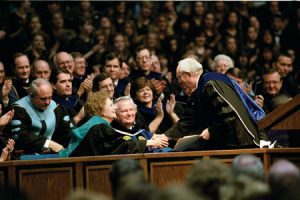
I regard this as a unique and wonderful university. I use that word wonderful in its literal sense—that is, full of wonder. Represented in this faculty is the accumulated wisdom of all of the ages of mankind. Whether their learning be in the sciences, the humanities, theology, the law, or whatever, these people have qualified themselves in the accumulated wisdom of the ages. . . .
This is the chief purpose of this wonderful institution—to pass on to students in a stimulating and provocative and effective way the wisdom of the ages in all fields of man’s endeavors. The process is at times difficult. I know the pressures are painful. The stress is unremitting. But the rewards are tremendous. When the Lord in revelation invited us, yes, even commanded us, to “obtain a knowledge of history, and of countries, and of kingdoms, of laws of God and man, and all this for the salvation of Zion,” he set the broad parameters of the wonderful curriculum of this great and singular institution (D&C 93:53). (“A Wonderful and Unique University,” Oct. 11, 1988, p. 2)
Sweet Victory
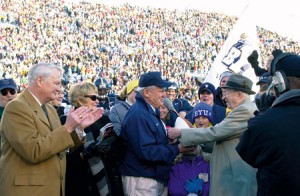
I am grateful to be here this Tuesday when all of us are basking in the afterglow of Saturday’s victory [over the University of Notre Dame]. I congratulate Coach Edwards and his associates. I compliment most warmly the members of the team. . . .
Our special elation is understandable. BYU beat the team that over all the years of football has been considered most formidable. Notre Dame is the university that won seven Heisman trophies and eleven national championships. . . . Last Saturday’s contest was a particularly interesting one. Here were the teams of two great universities, each sponsored by a religious institution. Notre Dame can take consolation from the fact that they have won two out of the three games BYU has played with them. But it was sweet victory on Saturday. (“Codes and Covenants,” Oct. 18, 1994, p. 1)
Trees of Faith
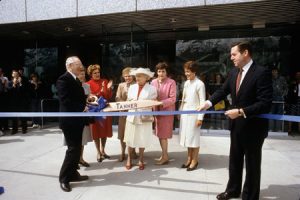
What a remarkable group you [alumni] are. You serve on the faculties of most of the universities of America, as well as others abroad. You are scientists who are making a tremendous contribution with your discoveries and research. You are doctors and dentists and lawyers. You are architects and engineers. You are educators, school administrators, sociologists, biologists, economists, and business executives. You are good people who love the Lord and who in turn are loved by Him. I believe you appreciate your alma mater today even more than when you were [students]. It has left an indelible imprint upon your very natures. The seeds of testimony planted and nurtured in those early days have grown into tall and rugged trees of faith, which bring shelter and beauty to many around you. (“A Great and Distinguished Family,” Nov. 27, 2003, in BYU Magazine [winter 2004], p. 67)
Golden Years of College
What a unique and beautiful place this is! How rich and wonderful are your opportunities! . . .
. . . I hope your experiences here will be both challenging and pleasant. You will likely never have a greater opportunity for happiness. Cultivate good friends while you are here. Drink in the beauty of this campus—the sweeping lawns, the trees, the magnificent buildings, the mountains that rise to the east, and the quiet waters of the lake to the west. Be affirmative about your classes, and look upon the demands of your Church responsibilities as opportunities. Be happy with singing and dancing, enjoy football and basketball—yell when you win; cry, if you wish, when you lose.
Experience the fun and the hard work; both are part of the joy of being alive when you are young and healthy, and your chin is high with a smile on your face.
These are golden years. . . . Enjoy your days, every one of them, and, when you leave and the years pass with the cadence of the seasons, may you look back with fondness and smiles to happy times on the magnificent campus of your beloved alma mater. (“If I Were You, What Would I Do?” Sept. 20, 1983, p. 2)
The Loneliness of Leadership
It was ever thus. The price of leadership is loneliness. The price of adherence to conscience is loneliness. The price of adherence to principle is loneliness. I think it is inescapable. The Savior of the world was a man who walked in loneliness. I do not know of any statement more underlined with the pathos of loneliness than his statement:
. . . The foxes have holes, and the birds of the air have nests; but the Son of man hath not where to lay his head. [Matt. 8:20]
There is no lonelier picture in history than of the Savior upon the cross, alone, the Redeemer of mankind, the Savior of the world, bringing to pass the atonement, the Son of God suffering for the sins of mankind. . . .
I would like to say to you here today, my brethren and sisters, there is loneliness— but a man of your kind has to live with his conscience. A man has to live with his principles. A man has to live with his convictions. A man has to live with his testimony. Unless he does so, he is miserable— dreadfully miserable. And while there may be thorns, while there may be disappointment, while there may be trouble and travail, heartache and heartbreak, and desperate loneliness, there will be peace and comfort and strength. (“The Loneliness of Leadership,” Nov. 4, 1969, pp. 3, 5–6)
Storied Sobriety
It is an honor and a rare privilege to speak to this “stone-cold sober” gathering of university students.
You have done it again. You have made the national news. I was in Oregon on Sunday participating in a conference and read in the paper the Associated Press story of thePrinceton Review’s “Advantage Guide to the Best 310 Colleges.” . . .
. . . I said to myself, “What a significant honor this is. It says in effect that BYU is judged to be the number one large university in terms of sobriety and a no-nonsense attitude on the part of the student body on why they are going to a university—that is, to gain an education to prepare for constructive careers.”(“Stand Up for Truth,” Sept. 17, 1996, p. 1)
The Great Day of Preparation
This is the great day of preparation for each of you. It is the time of beginning for something that will go on for as long as you live. . . . Don’t be a scrub! Rise to the high ground of excellence. You can do it. You may not be a genius. You may be lacking in some skills. But you can do better than you are now doing. You are students at BYU. Most of you are members of this great Church whose influence is now felt all over the world. You are people with a present and with a future. Don’t muff the ball. Be excellent. . . .
You will find your greatest example in the Son of God. I hope that each of you will make Him your friend while you are here and ever after. (“The Quest for Excellence,” Nov. 10, 1998, p. 4)
More than 30 of President Hinckley’s devotional and fireside addresses can be found online in their entirety at speeches.byu.edu.







